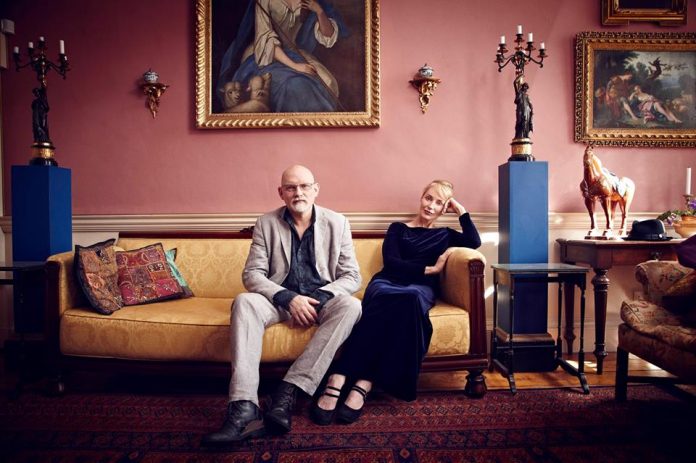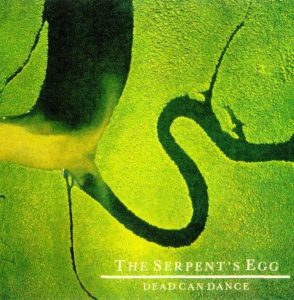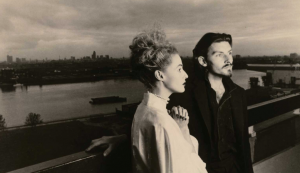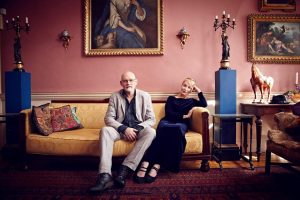“The Host Of Seraphim” DEAD CAN DANCE 1988 – The Serpent’s Egg is the fourth studio album by Australian musical act Dead Can Dance. It was released on 24 October 1988 by record label 4AD. The album was the last produced while Brendan Perry and Lisa Gerrard were a romantic couple. A majority of the album was recorded in a multi-storey apartment block in the Isle of Dogs, London.
Perry discussed the album’s title: “In a lot of aerial photographs of the Earth, if you look upon it as a giant organism—a macrocosmos—you can see that the nature of the life force, water, travels in a serpentine way”
1988 The Serpent’s Egg Released: 24 October 1988 (CAD 808, CADC808, CAD 808 CD)
Formats: 12″ LP, cassette, CD Label: 4AD Records. Producer: Lisa Gerrard, Brendan Perry, John A. Rivers
Dead Can Dance upper body shot of a forty-five-year-old man at left. He is peering at a stringed instrument on a lectern. A microphone is directed to a forty-three-year-old woman at right. She is shown partly in left profile, singing with her eyes closed, her left hand rests on top of the lectern. She wears a ring on her left hand. In the background is musical equipment, a high stage curtain and a foot-light.
Official Lyrics
♪ The Host of Seraphim ♪
I thought that you knew it all
Well you’ve seen it ten times before.
I thought that you had it down
With both your feet on the ground.
I love slow … slow but deep.
Feigned affections wash over me.
Dream on my dear
And renounce temporal obligations.
Dream on my dear
It’s a sleep from which you may not awaken.
You build me up then you knock me down.
You play the fool while I play the clown.
We keep time to the beat of an old slave drum.
You raise my hopes then you raise the odds
You tell me that I dream too much
Now I’m serving time in disillusionment.
I don’t believe you anymore … I don’t believe you.
I thought that I knew it all
I’d seen all the signs before.
I thought that you were the one
In darkness my heart was won.
You build me up then you knock me down.
You play the fool while I play the clown.
We keep time to the beat of an old slave drum.
You raise my hopes then you raise the odds
You tell me that I dream too much
Now I’m serving time in a domestic graveyard.
I don’t believe you anymore … I don’t believe you.
Never let it be said I was untrue
I never found a home inside of you.
Never let it be said I was untrue
I gave you all my time.
Dead Can Dance is an ambient, world music band which has released eight studio albums so far, two live albums, four compilation albums, one video album, one extended play and nine singles. The band formed in Melbourne, Australia in 1981 but relocated to London, United Kingdom in 1982 and signed with 4AD Records where they disbanded in 1998.
“Severance, the birds of leaving call to us…”
On the cover of Anastasis, Dead Can Dance’s first album in 16 years: a field of sunflowers, ripened, and then blackened, by the sun, standing with sad, slightly crowned heads. Less dead than dormant, the heads and stems will one day be chopped, but then via the roots, will return. For Anastasis is the Greek word for ‘resurrection’ and the seemingly dead will dance again.
“I thought Anastasis was a good title given our reunion,” explains Brendan Perry, who, with Lisa Gerrard, formed the band in Melbourne, Australia in 1981, releasing seven studio albums, and one live album, before going their own ways after 1996’s Spiritchaser. “Anastasis also means ‘in between two stages’,” he adds. “Regeneration comes with the next season.”
Anastasis is perfectly apt given how the album is an astonishing regeneration of the legendary beauty, power and spellbinding nature of the duo’s unique sound and vision. Age hasn’t withered DCD, not the passing of the years; if anything, the album sounds bolder, stronger, more confident in its vision. There’s surely no other musical force on the planet that sounds so stately and yet mesmeric; who combine so effortlessly the spiritual and the earthbound with music that’s not tied to any one century, but roams freely between the ages as well as the continents.
There have been sublime Gerrard and Perry solo albums before Spiritchaser and since that unintentional finale (album sessions for a follow-up were eventually abandoned), but there is something unbeatable about the combination of these two musical minds and voices; and two voices, don’t forget, that are brilliant forces of nature in their own right. Gerrard takes the lead on four tracks, “Anabasis”, “Agape”, “Kiko” and “Return of the She-King”, delivered in her wordless Glossolalia, while Perry fronts the remaining four of “Children of the Sun”, “Amnesia “, “Opium “ and “All In Good Time”, whose lyrics embrace the faiths and hopes of humankind, working through our limitations, weaknesses and habits.
“Children of the Sun” is the album’s ‘welcome to the show’, statement said Perry. The lyric addresses human evolution and how our genetic code is infused with ancient memory, right up to the present, celebrating nature – the Woodstock generation’s legacy. “Amnesia” weaves themes of humanity’s collective social amnesia – “how the victors always write history, and if we retain the real truth, we won’t keep repeating the same mistakes” – and how we depend on our memories for our humanity, and that the Greeks saw memory as the greatest muse of all.
“Opium”, says Perry, is more nihilistic, “that opiate state of mind, a form of depression, that traps you, whether it’s addiction or just circumstances. To not be able to choose a road as they all seem to lead nowhere.” But “All In Good Time” is a positive finale, underlining the old adage that good things come to those who wait; as we grow with age and experience, we see the benefit of not expecting everything to arrive at once.
 A Greek word to represent the album is equally derived from the music’s origins. While Perry can hear echoes of DCD past, “from right across our catalogue,” he reckons the core of Anastasis can be found, “slap bang” in the near-Eastern Mediterranean, from Greece and Turkey across to North Africa. “The music I listen to and research becomes both unconsciously and consciously part of a new project, and for this album, I’ve been fascinated by the classic immutable elements of Greek culture, the depth of their music and their love for song that you don’t get as much in the west; the way they combine philosophy and love songs, and throw a bit of science in there too. I love the eastern influence that comes from being a crossroads between east and west, the kaleidoscopic mosaic of those fused cultures, while the further west you go, the more it’s a mono-cultural society.
A Greek word to represent the album is equally derived from the music’s origins. While Perry can hear echoes of DCD past, “from right across our catalogue,” he reckons the core of Anastasis can be found, “slap bang” in the near-Eastern Mediterranean, from Greece and Turkey across to North Africa. “The music I listen to and research becomes both unconsciously and consciously part of a new project, and for this album, I’ve been fascinated by the classic immutable elements of Greek culture, the depth of their music and their love for song that you don’t get as much in the west; the way they combine philosophy and love songs, and throw a bit of science in there too. I love the eastern influence that comes from being a crossroads between east and west, the kaleidoscopic mosaic of those fused cultures, while the further west you go, the more it’s a mono-cultural society.
“Also the instrumentation we choose to work with suggests what the music should become. “Opium” – which uses a Moroccan Sufi 6/8 rhythm – and “Anabasis” feature the Hang, a cross between a West Indian steel drum and a gamelan gong.”
Perry says the duo have been talking about another album since Dead Can Dance’s world tour of 2005. But that extensive tour was exhausting, and the incentive was lacking, so it was put on the backburner until calendars could again be synchronised – not so easy since Perry lives in the centre of Ireland (the land of his ancestors), where Anastasis was recorded (at Perry’s converted church studio Quivvy) and Gerrard lives in Southern Australia. Once upon a time, they left Melbourne for London, settling many floors up in a council block on the Isle of Dogs, putting whatever pittance they had into their music.
Signed by 4AD and releasing their first album in 1984, the duo drew rapturous reviews for albums that spanned neo-classical and folk across time and geography, each album selling to a progressively larger audience, the emotional drama of their coming to the attention of the San Francisco ballet, Hermes Perfume and a documentary on Hitler and Stalin; likewise motion pictures such as Heat, The Crossing Guard and Baraka. Gerrard developed her own solo film soundtracks – The Gladiator and The Insider, for example – while Perry worked on solo albums such as 1999’s Eye Of the Hunter and 2008’s Ark. The pair dissolved their physical relationship in the early ‘ 90s but something keeps them together – a bond of deep friendship and musical compatibility and understanding, and so Anastasis is born, and Dead Can Dance regenerated.
Free of any contractual commitments to 4AD, DCD have paired up with Play It Again Sam, who are releasing Anastasis in time for the duo’s most extensive world tour ever, which starts in Vancouver on August 9th and visits 4 continents throughout 2012 and 2013. And when the tour is over, Perry anticipates another DCD studio album will come together. The sunflower comes back season after season; there is no reason why Dead Can Dance, their spirit rekindled and their soul regenerated, won’t do exactly the same thing.
_______________________________________________________
DEADcanDANCE – Richard Jones – Key Music Management ltd














